I have known how the minutes stretch their legs
How they freeze, and change into ages
I have come to a cave on the seashore
My forehead is branded
A night has hardened on the rocksI have left the seahorses to chew
My entrails
And scatter them in space
I have seen the horror of boats breaking
While the echo fell
Vainly through a labyrinth of echoes
Casting over my eyes a spell of darkness:
In the wind it howls, begs, and falls at last.
The sea dashes and retreats
Dead fishSettle in my blood
Rotten fruit, and peelings
My hand clenches and melts in the sand
The sand’s winds eat into it
And whistle in my veins
An old knife
Cuts into my flesh, and I bleed.
–Would I have the nerve to revolt?
My God, how the minutes stretch their legs
How they freeze, and change into ages!
Oh, You descended and came to me,
Unexpected visitor
You heaped my tableWith the fragrant manna and quails
You poured the wine
From a new kind of jar
You gave me reign over the genii of the caves and the seas;
Whatever my heart would have appears in my hand!
In the clay dwells doubt, and loss of reason.Houris, rubies, buildings
With a magician’s tap: ” Be!11 and it is•
The fire blooms, fills my fireplaceYields fruit, and spring Crawls in to furnish my room
The frost retreats
The sun appears from behind the arctic cloudI warm it, and it moves peacefully on
In its absence I blow on the dying cinders
I render the land fruitful and chase death away
* * *
Oh, you carried to me the fragrance of manna and quails,
You drew my hand to hidden treasure
Whatever I desired appeared.I was ashamed of my poverty,
I shed my blood, slashed my jugular vein.Do not hide in the caves of the horizon,
Ruddy and iron-barricaded!
My eyes have been transfixedLidless, to the iron sky
And I am afraid that a brimstone storm
May explode the laughter of madness in them.
I no longer know who you are;
The red curse is on my lipsAnd on my lips, pain and prayers
Shame exposes my isolate cave Lonely among the distant caves And do I scream at him–
The beseecher of impossibilities —The mighty magician who was here, and died?
How the rags disintegrate
From the corpse of the mighty one,
How they fall down, like strange ghosts
Who pass and are scattered at the roadside!
Mother, do not implore me
In the dusk with your tears, I have no faith in:“Behind the eaves, behind the desert of the shore••. “
“A spade, a field, a Zibrctry and a house.”
My reign over the genii of the caves and the sea!
The manna and the quails
And the wine from a new jar!What else but a hungry cave,
Stagnant mouth
And a hollow hand that writes and erasesThe hollow lines in listless motion?
These hands of the clock do not turn:
My God, how the minutes stretch their legsAnd freeze, and change into ages!
(1965)
The Prisoner
My fear is gone now: are my senses mad?
Have the echoes returned–is my head whirling?
Who has shaken the prison night from my chest,
And that nightmarish wall?
For an age the blind stovepipe hole has been cloggedwith dust.
But what is this?
Now it is split by daylight,And an echo invites me to escape!
The sun through the opening, the children’s laughter,
Remnants of life in a wasted field
That knew my shadow, my toil,My hand singing to the grain–
All invite me to escape.
Is that delirious echo back?Is it the whirling in my head?
How often has that echo beguiled me,
How often have my nails
Combed and scraped the prison wall,And split on the deceiving stones?
Close the prison door to daylight; It was long ago
I dreamt of amnesty and escapeBefore the seconds rusted in my heart,
Before there was an echo to compute them, before the
feverish waiting,
Before I was swallowed by the prison dark,Before the dust gnawed at my eyelids,
Before my cramped limbs dropped
Into dust and decay, the bones scatteredBy mice-feet, to rot over the years.
–How can they draw together again, grow supple, and live,
Or dream of a return?
What return would death make to the feeble creature?What visions die in the smoke of the cafe,
And what escape is there from one hiding place to the next?
The jailor’s foul tongue
Stirs poison in my wounds.The desire of the phoenix has died in the ashes,
And she and the world conceal their mutual hatred;
How will she draw together again, grow supple, and live?What nonsense does that insolent jailer mutter?
He has brought me amnesty for punishment
Now that my bones have been rotting for years.Shall I leave them here and go my way, Faceless, with hollow limbs,
A wind-whipped ghostDisgraced by the sunlight
And the children’s laughter,
Dodging between the walls?
Close the prison door to daylight:It was long ago
That I dreamt of amnesty and escape.(1957)
From “An Anthology of Modern Arabic Poetry 1945-1984”. Translated by John Mikhail Asfour, The Department of English – McGill University, Montreal, 1984
* Khalil Hawi was born in Shuwayr, Lebanon. He studied philosophy and Arabic literature at the American University of Beirut, where he returned in the capacity of Professor of Arabic Literature after receiving a doctorate in that subject from Cambridge University in England. He has written a number of critical studies of Arabic, English and French poetry, including Khalil Gibran: His Background, Character, and Works (1963) in English, and is the editor of the Ency clopedia of Arabic Poetry. The influence of the spiritual tradition in modern and medieval Arabic poetry is mingled in his work with such Western influences as the poetry of Shelley, T.S. Eliot and Ezra Pound, and the philosophy of Sartre and Nietzsche. His vision of the world is a gloomy one, yet ultimately far from pessimistic: Hawi believes in the possiblity of profound social change once the Arab world has thrown off the shackles of the past and channelled its spiritual resources into the construction of its future.
Hawi’s first volume of poetry (1940)-was in the-Lebanese dialect; he then turned to Modern Standard Arabic and met with greater success in subsequent publications. In his metrical free verse, philosophical depth is conveyed by simple dic tion, and finds its expression in symbols inspired by popular legends (the truth-seeking Sinbad, for instance, torn bet ween the values of the East and the West) and in rhythms adapted from folk songs.
His collections of poetry include Nahr al-Ramad [River of Ashes](1957), Al-Nay wa 1-Rih [The Flute and the Wind] (1961), Bayadir al-Ju [The Threshing-floors of Hunger](1965), and Al-Racd al-Jarih [The Wounded Thunder](1979).
On June 6, 1982, two days after the Israeli invasion of Lebanon, Hawi committed suicide.

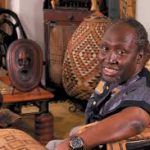
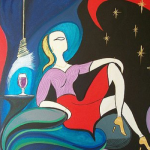
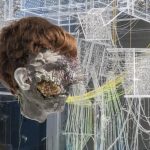
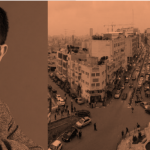
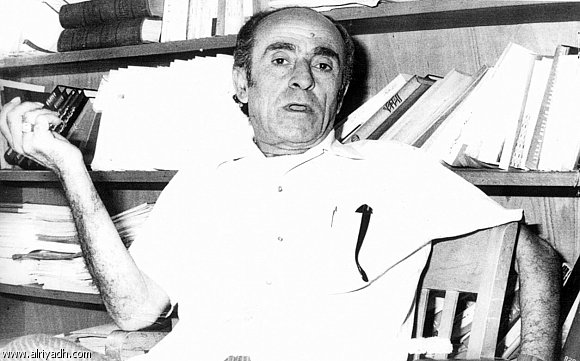
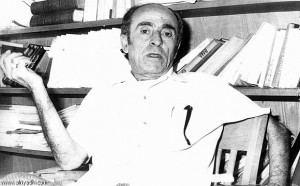
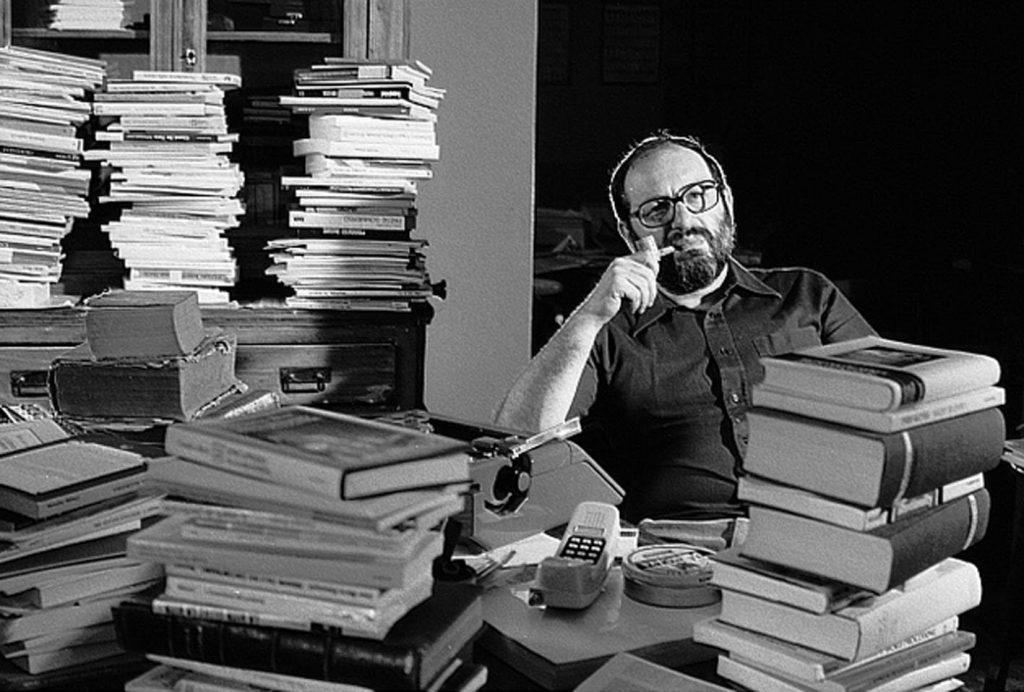
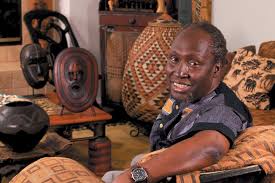
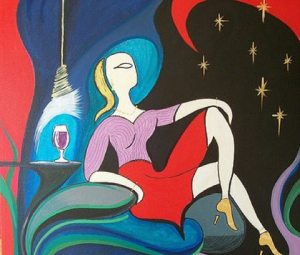
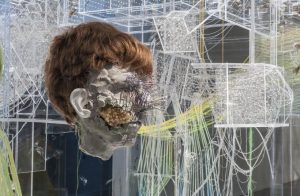
Ramallah / Bei Dao
In Jerusalem / Mahmoud Darwish
A Love That Hovers Like a Bedeviling Mosquito / Shatha Abu Hnaish